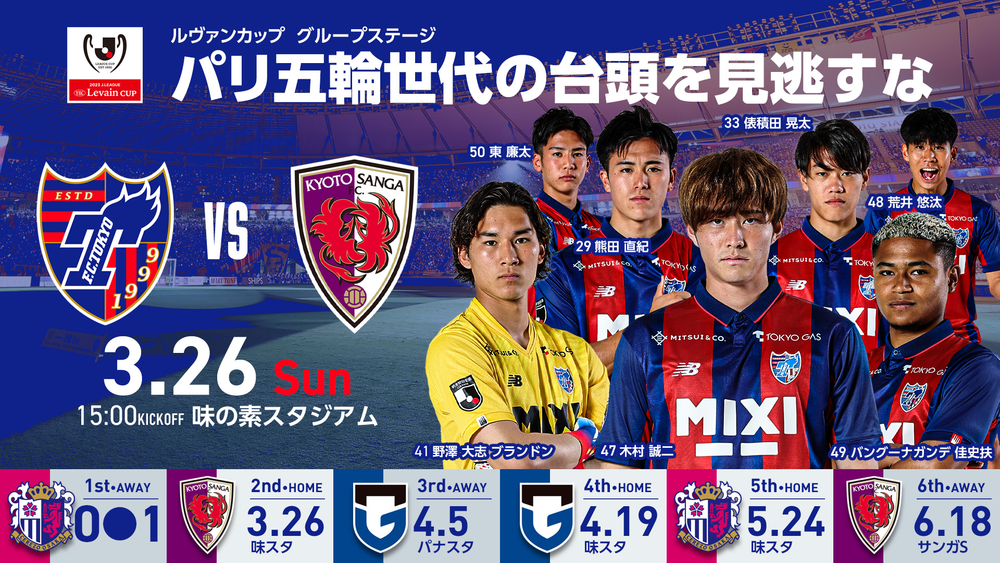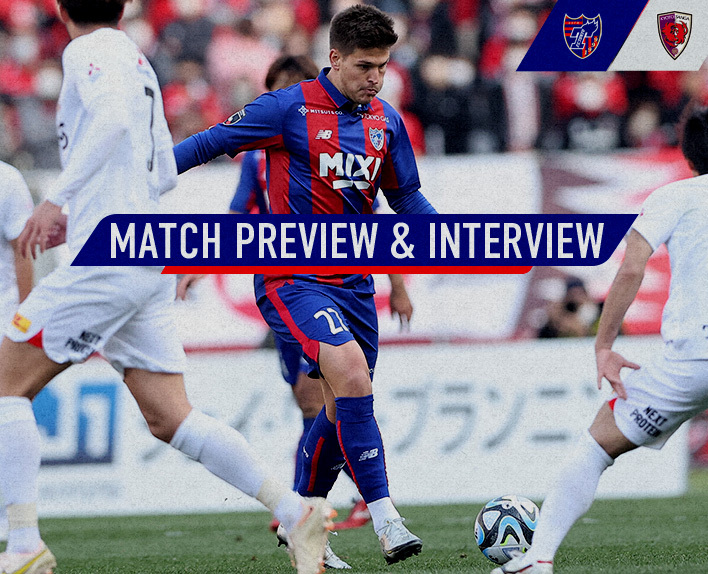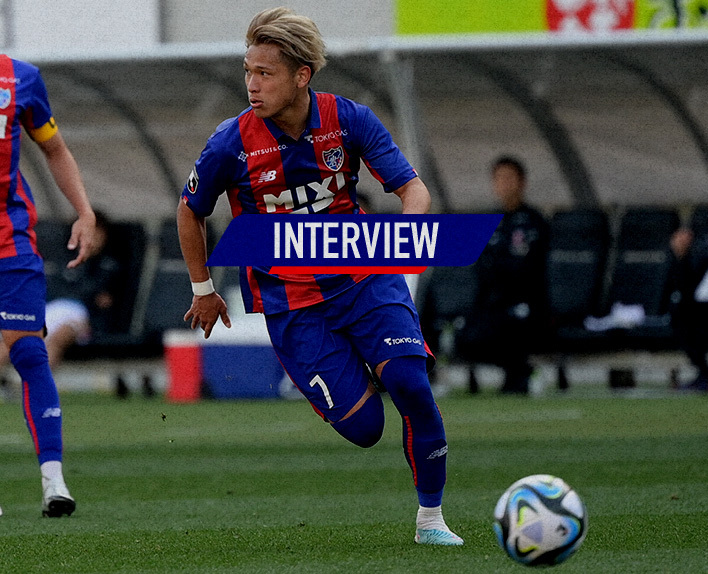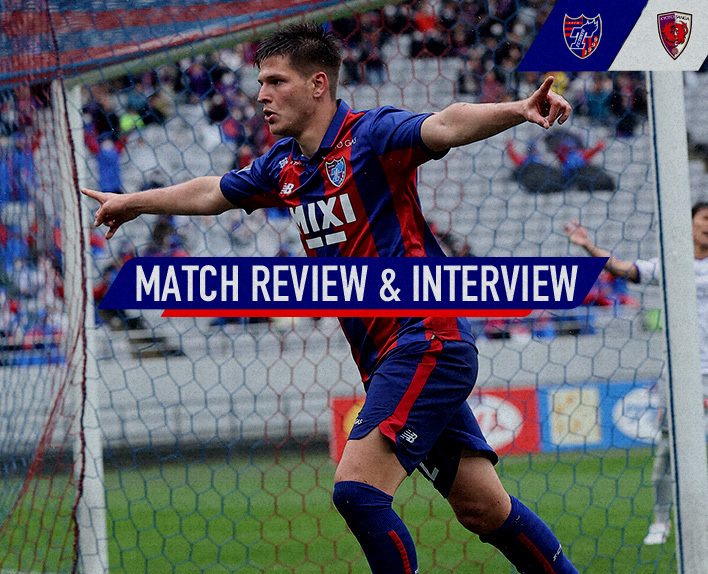<Match Preview>
In the first match of the group stage of the Levain Cup, we lost 0-1 to Cerezo Osaka. Although it was a disappointing start, many young players, including Ryunosuke SATO from FC Tokyo U-18, had the opportunity to play on the pitch. The 16-year-old SATO reflected positively after the match, saying, "The 60 minutes I played were the most intense of my life. I want to carry this forward to the next match."
In the second match, we welcome Kyoto Sanga F.C. at home. True to the team led by coach CHO Kwi Jae, the foundation is a style of soccer that values high pressing and strength in duels. Adding to that are the heights of Kosuke KINOSHITA and PATRIC, and after defeating Tokyo in Sec. 3 of the league, they gained momentum with three consecutive wins. For Tokyo, this is naturally an opportunity to avenge that defeat.
Kuryu MATSUKI and Naoki KUMATA, who participated in the U-20 Asian Cup as members of the Japan national team, have returned to the team. There are high expectations for KUMATA, who became the top scorer of the U-20 Asian Cup with 5 goals, as he makes his official match debut after turning professional. As Matsuki said, "If we can lead the younger players, the team will naturally become stronger," the performance of young players will surely contribute to the overall improvement of the team. To build momentum for the consecutive matches starting in April, the players will aim to secure victory with dynamic football.
The matchday program is here
[Interview with Coach Albert PUIG ORTONEDA]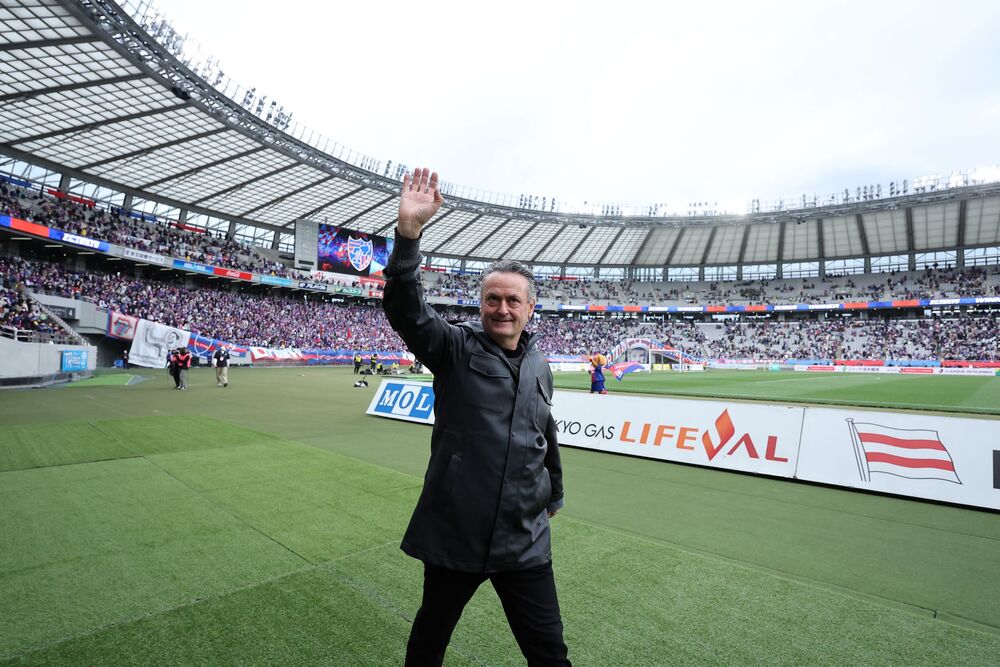
Q: There is a week until the next league match, and I think we have some time to spare, but what kind of lineup will we have tomorrow?
A, I think that not only players with few opportunities to play, but also several players who are participating in the league matches will join. I would like to give some of them a rest. As for the other players, I believe there are some who have been preparing for a week and are ready to play. I want to continue giving opportunities to young players, and I would like to continue that this time as well. Whether they start or come on as substitutes, I want to give young players a chance.
Q: You mentioned that players who participated in the league matches will also be used. Do you think it is better for them to play considering their condition?
A, there are parts that are like that and parts that are not. What we need to keep in mind is that there will be a congested schedule in April. This season has periods of congested scheduling, but there are also times with very few matches, resulting in an irregular schedule. There will be weeks without matches even in the summer. Since April will have a congested schedule, we selected this week's members with that in mind.
Q: What is needed to advance from the group stage?
A, regarding the first match against Cerezo Osaka, I don't think we played in a way that deserved to lose. At the very least, a draw was a fair result. In every match, we always aim to win. However, if we only focus on the results, when will we be able to utilize young players? To determine how much young players can grow and what they are capable of, it is essential to let them play in official matches. As I commented before, I hope that the Levain Cup will establish rules that require more utilization of young players, making it a tournament where young players can thrive.
Q: It is said that there is no difference between the world and Japan until the age of 18, but is the gap that opens up three years later due to the difference in experience in official matches?
There are various stages of growth. I believe it is most important to allow players to play more freely until the age of 12. In that regard, I think Japan is functioning well. It is necessary for the junior youth generation in Japan to learn tactics at the academy over three years. I also think Japan is moving in a good direction in that aspect.
What remains as a challenge is the youth generation, which is the stage before becoming a professional. To cultivate high-level professional players, the youth, or what is referred to as the university age in Japan, is crucial. The generation from 19 to 22 years old gains experience and grows through competition. For example, how much has Matsuki grown in just one year last season? I believe he has grown tremendously. This is because he had to focus on competition and was able to participate in official matches. If he hadn't been given the opportunity, he wouldn't have grown. On the other hand, in other countries, that generation is gaining experience in high-level official matches and growing. I think Japan has room for improvement in that regard. Unless we improve that aspect, I believe it will be difficult to aim for higher levels.
To aim for a higher level, it is important to accumulate challenging match experiences in the generation around the age of 20. While I believe that sometimes wonderful players like Mitoma will emerge, I think fundamental reforms are necessary for such outstanding players to appear consistently.
It is said that central players are important in soccer. I believe that positions such as goalkeeper, center-back, defensive midfielder, and center-forward are still not at a high level in Japan. The reason for the thin player pool in Japan is that, for example, how many professional soccer club coaches would consider using a young center-forward? I think there are also few coaches who would use an 18-year-old goalkeeper in league matches. The same goes for 17-year-old center-backs. The difficulty in making the decision to use young players in central positions is the same in any country. However, in Japan, because young players are not being utilized in that zone, it has created a vicious cycle where they do not develop well.
Q: Is there a possibility that young players who have not had the opportunity to play so far will participate tomorrow?
A, I am thinking of giving opportunities tomorrow. However, opportunities are not something that are given as a gift; they must be earned. I am not at all worried about using young players. However, whether to give opportunities to any young player depends on their ability to prove they have a high level and possess a strong mental attitude filled with motivation. I am fully prepared to support young players in their future growth. However, whether they can seize the opportunity is up to them.
Q, Kashif BANGNAGANDE has been selected for the Japan national team.
I expect Kafumi YOSHIFU to continue to grow. The level required as a member of the Japan national team is very high. I believe that his classmate Takefusa KUBO has reached a wonderful level. My wish is for Kafumi YOSHIFU, Hotaka NAKAMURA, Kuryu MATSUKI, Takefusa KUBO, Naoki KUMATA, and Kota TAWARATSUMIDA to be named among the members of the Japan national team.
[Player Interview]
<PEROTTI>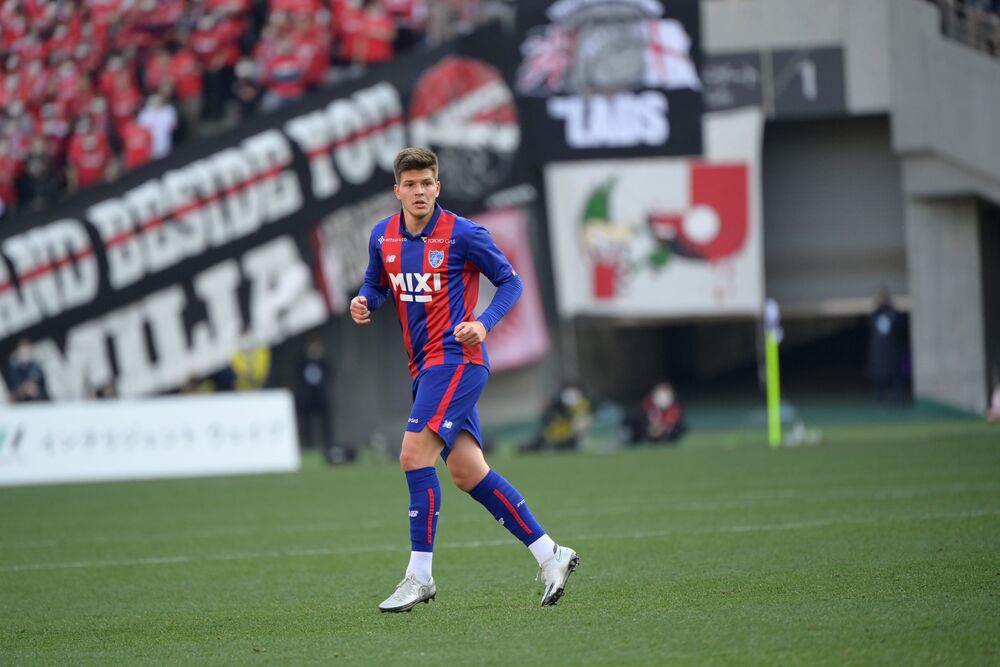
Q: There was hardly any playing time in the Nagoya match, but did you feel any regret?
I always have the desire to participate in matches. However, there are also the developments of the game and the coach's strategies, so I understand that. Rather than feeling frustrated, I think it's just how it is. The style of Japanese soccer is different from the style I have played until now. I have only just arrived in Japan and haven't participated in many matches. Of course, I need to adapt, so I want to play better from now on and contribute to the team's victory.
Q: I believe you are always included in the substitute members for practice matches and league games. Do you think it's because you just joined and there are no issues yet, or do you feel that you need to score even in a short amount of time to secure a starting position? What are your thoughts on this?
A. Regardless of how many minutes I play, I am prepared to score. Whether it's 5 minutes or 90 minutes, I believe my role is to give my all during the time I am on the field. As a forward, I have the desire to score every time. However, scoring is not easy, and it is not something that can be achieved easily. Although I haven't scored yet, there may be matches where I can score 2 or 3 goals. I think this is part of the flow of the game.
Q: When a good shot is made during practice, the fans are also excited, but how is your own performance and condition?
I always think that what we practice leads to goals in the matches. I want to have good practice to prepare for the games. Of course, after finishing today’s practice, I plan to have even better practice tomorrow. I have the desire to score goals, but even if I don’t score, I hope to contribute to the team in other ways.
Q: I often see players not only from Brazil but also interacting with Japanese players, and I can feel their attitude of trying to blend into the team.
A, I don't understand much Japanese, but since coming to Japan, my teammates and staff have warmly and kindly welcomed me. I am grateful once again. On the pitch, everyone comes together and cares for me. Since my time at Chapecoense, I have had the desire to lend a hand to others and a feeling of respect for people. I have always communicated with various people.
Q: Have you found any enjoyment since coming to Japan?
A, I have always had the hope of playing in Japan. Within that, I was able to achieve my dreams and goals. I thought there would be challenges coming to Japan, but everyone here, including the city, has been truly wonderful, even better than I imagined. My wife is also enjoying life in Tokyo. I want to start from here and achieve my goals.
Q: Why did you want to come to Japan?
I had interactions with players who played in Japan in 2017. Those players said that Japan is a very good country, including its culture, customs, and soccer. I also had a strong desire to go to such a country.
Q: What surprised you in Japan?
A, there are two things. The first is that I think small children in Japan, around elementary school age, are very cute. Also, I was really surprised to see a 7-year-old elementary school student going to school alone, not with their parents. The second is the Shibuya Scramble Crossing. There aren't that many people in my town. I was shocked by how many people there were.
Q: Which Brazilian city is close to Tokyo?
A, if we are talking about a large metropolis, it would be São Paulo. However, it is not comparable to Tokyo at all.
<Taishi Brandon NOZAWA>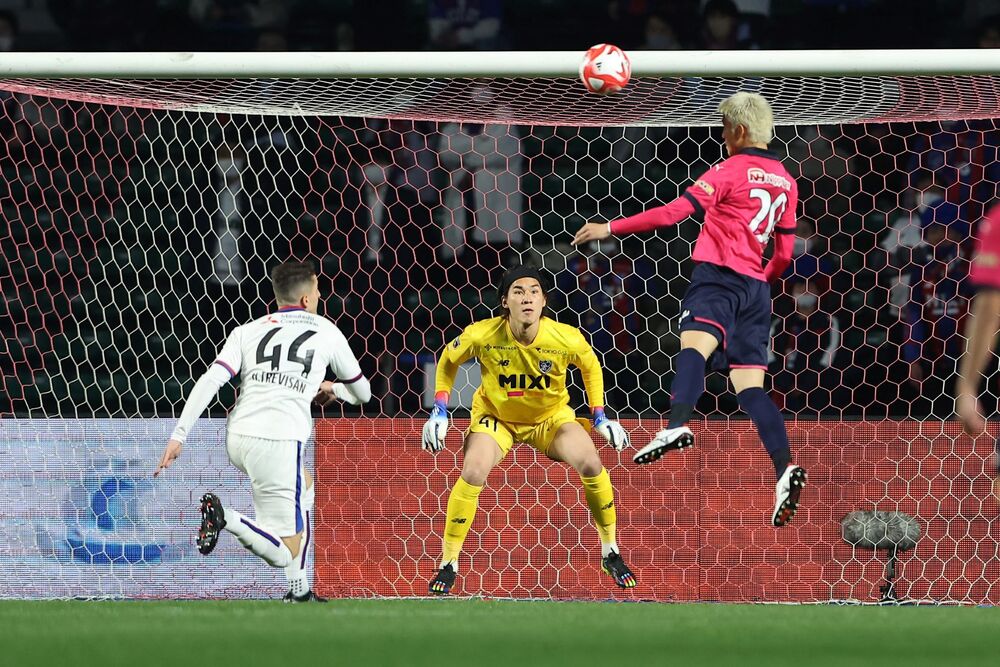
Q: After experiencing a loan transfer to Iwate Grulla Morioka for a year and a half starting midway through the 2021 season, please share your feelings about returning to Tokyo this season.
The league matches have started, and one match of the Levain Cup has also been held. Last season, I was watching Tokyo as a player from another team. Now, I am personally very happy and excited to be fighting as a member of Tokyo. Of course, I am not participating in the matches, but as a team, we are focused on winning every game and are able to practice diligently every day. I believe I am having very fulfilling days.
Q: What changes do you feel in Tokyo compared to before your transfer?
Before the transfer, Kenta HASEGAWA was the coach. I think there has been a significant change since Albert PUIG ORTONEDA became the coach last season. What I am currently working on is a style that I have never done before. In Iwate, we played in a different style than the soccer that Tokyo is aiming for now. Coming back to Tokyo, the goalkeeper actively participates in the attack, and during defense, it’s about how to maintain concentration and prevent the few chances we face. There are many elements that I have never experienced before. Adapting to this is a challenging task, but I feel a sense of fulfillment.
Q: Are you good at a playing style that requires goalkeepers to have good foot skills?
I am not particularly skilled at it, but that doesn't mean I lack confidence. After all, the most important thing as a goalkeeper is to protect the goal. This is where the greatest responsibility lies, and while I coordinate with the coach and the goalkeeper, the most important factor is to eliminate mistakes without taking risks. I don't think it's necessary to be exceptionally skilled with my feet to fulfill that. I believe that if I can do the fundamental things as a matter of course, there won't be any problems.
Q, please review the game. I have continuously stood on the pitch as the starting GK for Iwate Grulla Morioka and have also experienced promotion from J3 to J2. Please reflect on the past year and a half.
A、I believe I have learned the responsibility of participating in matches. Of course, the team has several goalkeepers, and only one can play in a match. I have been thinking about representing all those who support Iwate Grulla Morioka, including the sponsors that sustain the team, the staff, fans and supporters, and the local community.
Although I was allowed to participate in the match, I felt that my behavior was not suitable for a player on the field. Therefore, I learned that I really need to do more, to have more confidence and courage, and to take responsibility to stand on the pitch to help the team win. That was the most significant thing for me.
I have returned to Tokyo, and while I still need to grow technically, I have also gained confidence from learning about responsibility. I feel that I have much more composure on the pitch compared to before my transfer to Iwate, and I can make decisions more calmly. In that sense, I am truly grateful for the year and a half I spent in Iwate.
Q: This season, I started in the Levain Cup match against Cerezo Osaka. Although we lost 0-1 due to a late goal, I believe I felt both a sense of achievement and identified areas for improvement. How do you reflect on your performance?
A, just remembering it brings up feelings of regret and anger. For me, how to express the few opportunities I had to play in matches was very important, but I feel anger that it ended in such a result.
If you truly demand strictness from yourself, you must feel that you need to win even in matches like that. Looking at it calmly and from a distance, I think we were performing well until around the 86th minute. Of course, there were mistakes, and there were things we could improve as a team, but up until that point, we were pushing the opponent back and applying pressure, which left me with the impression that I was able to play calmly without panicking. Therefore, I am not too pessimistic and have switched my mindset to 'next time.'
Q: Not only Kashif BANGNAGANDE, who has been selected for the national team, but also young players like Kuryu MATSUKI, Naoki KUMATA, Kota TAWARATSUMIDA in his first year as a professional, and Yuta ARAI are gaining attention in Tokyo. How do you feel about the situation where young players are becoming a topic of discussion?
Indeed, Coach Albert PUIG ORTONEDA greatly respects young players and allows them to play. There are many great players in Tokyo, and young players practice together with them every day. In that sense, I believe that veteran players and those with experience are effectively helping to elevate the young players. Of course, it is also true that each young player's ability is high. While it is encouraging for the team to have a future, young players must understand that if they want to raise their own evaluation, it is difficult unless the team's evaluation improves.
Therefore, rather than thinking that it's because I'm young, I believe that I need to consider what I can do for the team to win, and think backwards from there. This is not just about being young; experienced players also think about what they can do for the team to win on a regular basis, so I want to make sure that I don't create any discrepancies in that regard.
Q: Isn't it a happy thing for Nozawa to see players from the academy succeed?
A, that's right. It's a happy thing for the team and the fans/supporters as well.
Q: Since there is only one position for a goalkeeper on the team, I think it is difficult to get opportunities and make an appeal. What are your goals for this season, and what do you plan to showcase?
As I reflect on my daily experiences, it is certainly important for a goalkeeper to master each individual skill. However, more than anything, it is crucial to help the team win and to become a player who provides a sense of security. Every day, I am compelled to think about how I can achieve this. I believe it is not something I can accomplish alone, so I rely on various people. This includes my teammates and I also listen to different insights from the goalkeeper coach. Since there are so many amazing players, I am curious about their thoughts and perspectives. I want to cherish each day and make the most of it.
Of course, I'm not currently the first choice to play in matches, but I am thinking about what is important now to become a goalkeeper who will lead Tokyo to victory on the pitch someday. While I seem to be looking ahead, I always put positive pressure on myself, thinking that it would be best if I could do that now. This season, I want to express my fighting spirit until the very end.
Q: Finally, please share your enthusiasm for the Levain Cup match against Kyoto with the supporters.
A, of course it is not a league match, but each one of us on the team is hungry for titles. We want to take what we can get, and I personally feel that way. I want to inspire that feeling and stand on the pitch with confidence. I really want this weekend to be one where the team secures 3 points and gains momentum for the next league match. I am looking forward to standing on the pitch at Ajinomoto.
